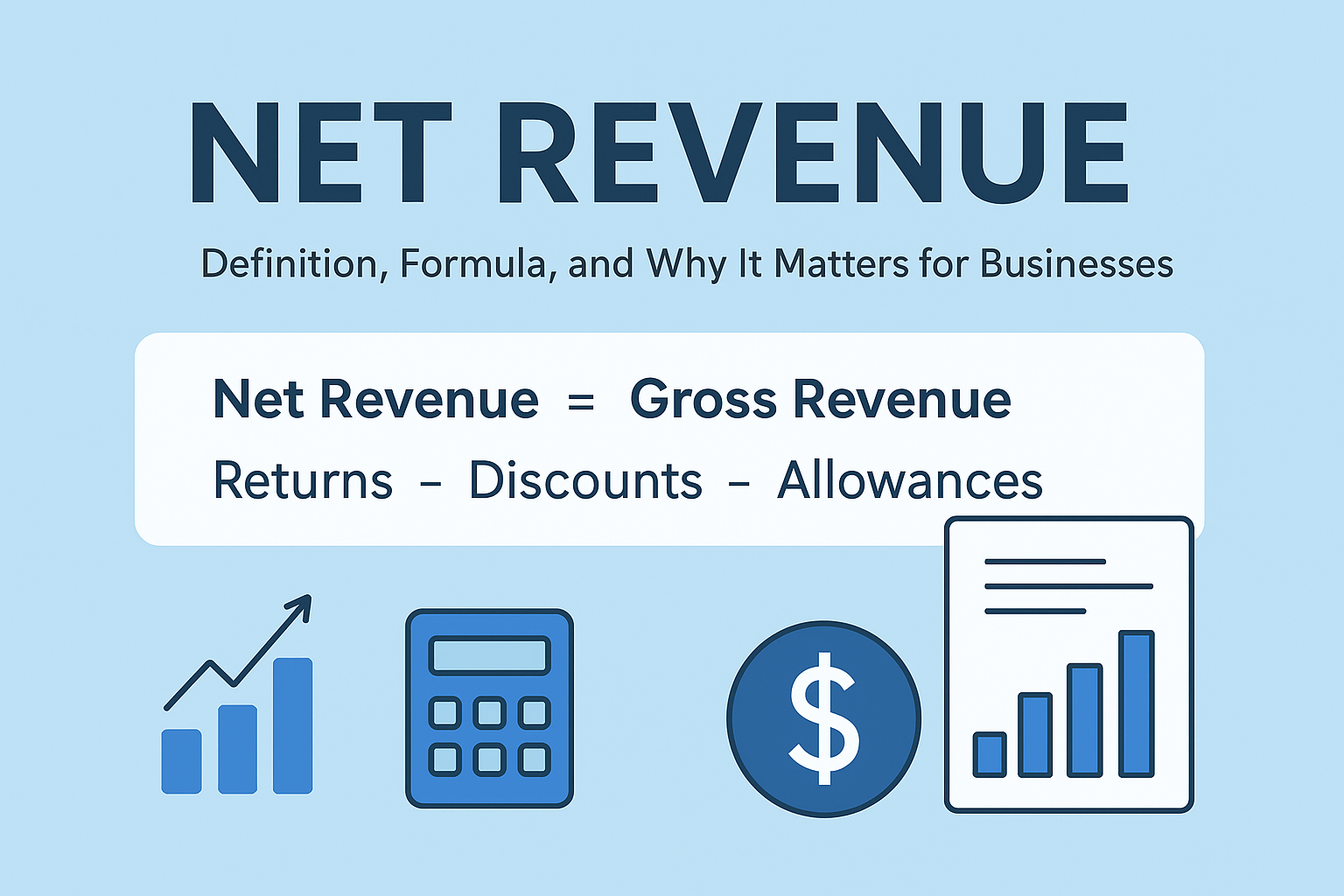DEFINITION: Net revenue (also called net sales) is the total amount of money a business earns from its operation after deducting returns, allowances, and discounts.
What Is Net Revenue?
Net revenue (also called net sales) is the total amount of money a business earns from sales after deducting returns, allowances, and discounts. It represents the real income from sales, not just the gross billing, and gives a clearer picture of a company’s actual performance.
In simple terms:
Net Revenue = Gross Revenue − Returns − Discounts − Allowances
This metric is crucial for investors, analysts, and business owners because it reflects how much revenue a company truly keeps after all adjustments.
Why Net Revenue Matters
Unlike gross revenue, which only shows total sales before deductions, net revenue is a more accurate measure of profitability and operational efficiency.
- For Businesses: Helps evaluate pricing strategy, sales performance, and customer satisfaction (fewer returns = higher net revenue).
- For Investors: Provides a clearer picture of a company’s financial health, avoiding inflated revenue figures.
- For Managers: Used to measure sales team performance and product profitability.
Example:
If a clothing brand sells $1,000,000 worth of products in a year but issues $50,000 in refunds, $25,000 in promotional discounts, and $10,000 in damaged product allowances:
Net Revenue= 1,000,000 − 50,000 − 25,000 − 10,000 = 915,000
This $915,000 is the true revenue reported on the income statement.
Net Revenue Formula
Net Revenue = Gross Revenue − (Returns + Discounts + Allowances)
Components of the Formula:
- Gross Revenue: Total sales before any deductions.
- Returns: Products customers send back for refunds.
- Discounts: Price reductions such as promotional offers or early payment discounts.
- Allowances: Price reductions due to product defects, damages, or late delivery.
Pro tip: Always distinguish between net revenue and net income. Net revenue is about sales performance, while net income reflects profitability after expenses.
Net Revenue vs. Gross Revenue
| Feature | Gross Revenue | Net Revenue |
|---|---|---|
| Definition | Total sales before deductions | Sales after returns, discounts, allowances |
| Purpose | Shows total sales activity | Reflects actual earned revenue |
| Reported on | Income statement (top line) | Income statement (after deductions) |
| Accuracy | Can be misleading | More realistic |
Example: A company reporting $10M gross revenue but $8.5M net revenue may face high returns or heavy discounts.
Examples of Net Revenue in Different Industries
1. E-Commerce
Amazon reports billions in gross merchandise sales but nets less after refunds, free shipping promotions, and discounts.
2. Software-as-a-Service (SaaS)
A SaaS company offering discounts for annual subscriptions and issuing credits for downtime must deduct those from gross revenue to calculate net revenue.
3. Retail
A clothing brand running seasonal sales will see a large difference between gross and net revenue due to heavy discounting.
How Businesses Can Increase Net Revenue
- Reduce Return Rates
- Improve product quality and customer support.
- Offer detailed descriptions to avoid mismatched expectations.
- Optimize Discount Strategies
- Avoid excessive discounting that eats into margins.
- Use targeted promotions instead of blanket sales.
- Streamline Operations
- Improve logistics to reduce allowances from late deliveries.
- Better packaging to minimize damaged goods.
- Customer Retention
- Loyal customers typically generate higher net revenue through repeat purchases and fewer returns.
Visual Suggestions
- Formula graphic: Simple infographic showing net revenue formula.
- Comparison chart: Gross vs. Net Revenue with example numbers.
- Industry case study: Bar chart showing how net revenue differs by industry.
Common Mistakes About Net Revenue
- Confusing it with net income → Net revenue is about sales, not profit.
- Using only gross revenue → Overstates business performance.
- Ignoring allowances → Leads to overstated revenue figures.
FAQs About Net Revenue
Yes. Both terms are often used interchangeably, though “net sales” is more common in retail.
It appears on the income statement after gross revenue but before expenses are deducted
Because it accounts for returns, discounts, and allowances, it gives a realistic picture of sales performance.
External links:
Key Takeaway
Net revenue is one of the most important financial metrics because it strips away the noise of gross sales and reflects true business performance. Whether you’re an investor, entrepreneur, or finance student, understanding net revenue helps you analyze companies with greater accuracy.
Action Step: Review your own business or investments, don’t just look at gross revenue, focus on net revenue trends for the real story.






